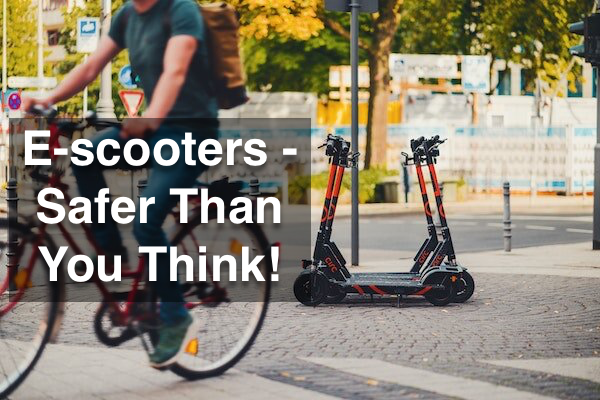As a PLEV owner since 2017, I’ve seen a lot in the mainstream media questioning the safety of Electric Scooters / Personal Light Electric Vehicles (PLEVs).
I decided to do a safety comparison between electric scooters / PLEVs and bicycles (excluding e bikes) , which shows that electric scooters / PLEVs can be a lot safer than people realise!
Electric Scooters vs Bicycles - Accident Statistics
PLEVs (electric scooters, electric unicycles and electric skateboards) are relatively new to the scene when compared to bicycles / other modes of transportation. Although I’m very familiar with the safety benefits of riding PLEVs (more on this further in this article), getting hold of UK accident statistics for the same time periods, was problematic. So a few assumptions had to be made.
Electric Scooter / PLEV Accident Statistics
In October 2020, the Bicycle Association estimated that there are about 200,000 electric scooters in the UK (https://www.theguardian.com/uk-news/2020/oct/07/the-e-scooter-road-menace-or-saviour-of-the-commute). It is unclear whether this figure includes the trial electric scooters (as part of the UK Government electric scooter trials) or personally owned devices, comprising of electric scooters, electric unicycles EUCs, one wheels or electric skateboards (estimated at 140,000 devices around late 2019).
However Police forces across the UK, revealed approximately 1,600 incidents for the year 2018-2019, involving electric scooters, hoverboards and Segways were reported (https://news.sky.com/story/electric-scooters-criminal-damage-and-traffic-collisions-among-hundreds-of-police-incidents-11790527).
Cycling Accident Statistics
According to Cycling UK, around 5-6% of the population aged 16+ in Great Britain as a whole ride their bikes at least once a week or more for transport purposes (https://www.cyclinguk.org/statistics) = 2.3 – 2.8 million people 2018.
ROSPA (Royal Society for the Prevention of Accidents) stated - “In 2018, 99 pedal cyclists were killed, 4,106 seriously injured and 13,345 slightly injured in Great Britain” bringing the grand total to 17,500 cycling related incidents.
Are Electric Scooters safer?
Electric scooters / PLEVs and cycling, are pretty much even as far as safety is concerned. The accident statistics work out as follows:
Electric scooter / micromobility Incidents = 0.64%.
(Based on 250,000 active riders with 1600 reported incidents).
Cycling Incidents = 0.70%.
(Based on 2.5Million active adult cyclists with 17,500 reported incidents).
Update - 5th January 2021
An article in The Telegraph by Hannah Boland, reported a new effort by the Metropolitan Police to further crackdown on personally owned electric scooters, due to collisions increasing from 4 in 2018 to 32 in 2019.
Whereas an article on the Mayor of London Website by Caroline Russell, reported an increase in cyclists killed or injured on London roads, from 4,521 to 4,755.
There are other aspects to electric scooters / PLEVs which make them even safer.
Why Electric Scooters / PLEVs can be Safer?
Slower than bicycles - Many experienced cyclists are used to riding anywhere between 20-30mph, whereas most electric scooters / PLEVs have a top speed of appx. 15.5mph. Like bicycles, there are versions that can be ridden faster (subject to road conditions).
Better Lighting - Electric scooters and electric unicycles typically have built-in front and rear lights, with one or both lights permanently on. Lighting is usually supplied separately for bicycles, resulting in many cyclists riding without any lighting.
See further ahead - Riding electric scooters or electric unicycles (EUCs) usually requires an upright riding position, enabling the rider to see further ahead than car drivers or cyclists.
Riding Position Comparison Between an Electric Scooter Rider, Car, Electric Unicycle Rider and Cyclist, Showing That Riders of PLEVs can see further!
Why Personally Owned Devices are Safer than Rentals
Electric Scooter Rentals
Rental electric scooters can be ridden with negligible outlay, often by first time renters, which presents a number of potential problems:
Riders are usually not familiar with the device they’re about to ride, often practicing in busy, built up areas.
Have little or no experience riding on roads.
Ride with minimal or no personal protection.
A rental scooter being someone else’s property, can sometimes result in careless riding behaviour / disposal.
Personally Owned Electric Scooters / PLEVs
Personally owned electric scooters / electric unicycles (EUCs) are considered to be safer than trial electric scooters for one key reason; INVESTMENT.
Such devices require a significant initial outlay, which the owner is keen to protect.
Owners of electric scooters / PLEVs usually take time to really understand their devices, acceleration, braking, device behaviour in different conditions.
Some devices such as electric unicycles etc. take more time / skill to learn. Often learning away from busy areas.
Owners are also more likely to invest in quality safety gear. The last thing a device owner wants, is to harm themselves and / or their device, preventing them from riding again!
Owners take their devices home.
Legalisation of personally owned devices will likely result in more sensible / defensive riding, further reducing accident statistics.
Careless Behaviour
Electric scooters / PLEVs are inherently safe. If such devices were unsafe, there would not be any UK trials nor would other countries have legalised them.
Sadly there’s always a minority of people showing careless behaviour, which can apply to bicycles, cars, electric scooters, motorbikes, e-bikes, PLEVs or trucks. Bicycles and electric scooters / PLEVs should never be ridden on pavements.
Do you think electric scooters / PLEVs are safe?
Let me know in the comments below!

